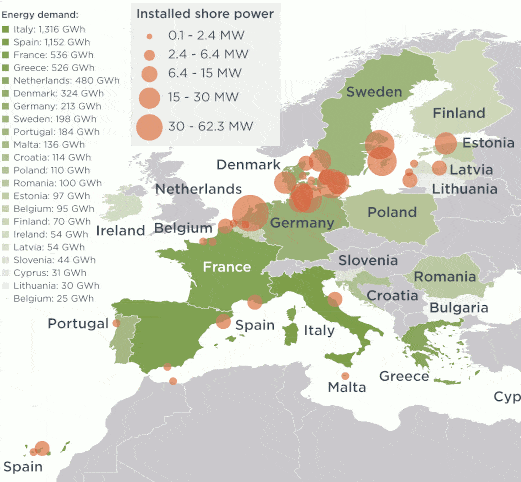
The current European standards for the abatement of greenhouse gas emissions
CO2 produced by ships of at least 400 gross tonnage
while they are moored in EU ports will reduce their
only up to 24%. This is highlighted by a working paper by the International
Council on Clean Transportation (ICCT), the
independent non-profit whose objective is to promote the
improvement of the environmental performance of the
Transport.
The study, carried out by ICCT researchers Liudmila
Osipova and Camilla Carraro, analyses the role that
cold-ironing for the supply of energy from the electricity grid of
land to ships that are moored in ports has within the framework of the
Union-led decarbonisation of maritime transport
which is based on two recently adopted standards: the
FuelEU Maritime Regulation and the FuelEU Infrastructure Regulation
alternative fuels (AFIR). The first is that from the first
January 2030 container and passenger ships (including those from
of at least 5,000 gross tonnage must
connect to shore power in major ports
that are part of the TEN Trans-European Transport Network
-T, while the AFIR aims to regulate supply
shore-based energy and incentivise infrastructure development
in TEN-T ports.
For the purposes of the study, the following was taken into account:
energy needs of ships docked in 489 ports
in 2019 and the cold-ironing electricity infrastructure
installed in EU ports, and calculates additional installations
necessary to achieve the objectives set out in the regulations.
In addition, the study estimates CO2 emissions from ships
berthed in EU ports and assesses the effectiveness of the
proposals to reduce them.
In particular, consideration was given to the approximately
15,700 ships that in 2019 stopped for more than two hours in the 489
major EU ports, requiring almost 5.9 terawatt hours of
energy; Almost 70% of this energy demand came from
ports of the TEN-T network. The study highlights that the types of vessels that
Tankers, passenger ships and
cruise ships (67% of total energy demand at berth),
which are also a major contributor to CO2 emissions
at the mooring. In 2019, half of the energy consumed by ships
at berth in EU ports was generated by naval units
ports in Italy, Spain and France, and mainly attributable to the
cruise ships which, as regards further installations of
cold-ironing plants needed to reduce emissions -
notes the research – in these three countries it would represent the
59%-63% of the total.
Noting that there are currently 51 ports in 15 Member States
cold-ironing infrastructure that provides
309 MW of energy, of which 283 MW for container ships,
passenger and cruise ships, the study estimates that the EU needs to triple its
o quadruple its installed coastal capacity by 2030
to meet the current ambitions of the FuelEU Maritime Regulation
and AFIR.
The analysis demonstrates the limitations of the current European regulations in this area.
CO2 emissions, which can also be used in terms of
as an indicator to assess the potential for reduction
air pollution in ports. According to the study,
the current level of ambition of the FuelEU Maritime Regulation and
of AFIR will lead to a reduction in emissions of only 24%
produced by ships at berth in EU ports, estimated to be equal to
to 4.37 million tonnes of CO2 in 2019. The study suggests
policy measures to reduce CO2 emissions and meet the
regulatory ambitions of the EU.
